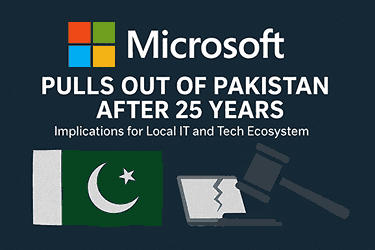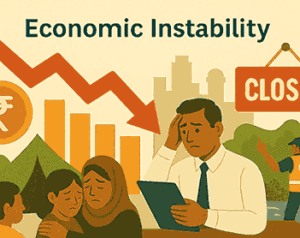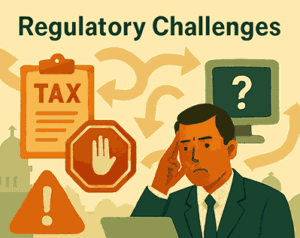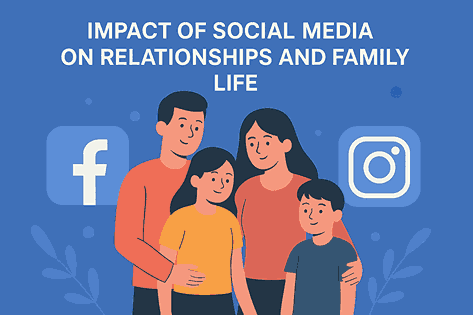Information & Technology
Pakistan
digital economy Pakistan, foreign investment Pakistan, IT challenges Pakistan, Microsoft 25 years Pakistan, Microsoft leaves Pakistan, Microsoft Pakistan exit, Pakistan business climate, Pakistan IT ecosystem, Pakistan tech industry, tech opportunities Pakistan, Zeeshan Azhar
Zeeshan Azhar
0 Comments
Microsoft Pulls Out of Pakistan After 25 Years: What It Means for the Local Tech Ecosystem

For over two decades, Microsoft had a strong footprint in Pakistan. Its presence not only provided enterprise-level technology solutions but also created opportunities for digital literacy, corporate training, and innovation across industries. However, in mid-2025, Microsoft officially announced the closure of its direct operations in Pakistan, ending a 25-year journey.
Instead of running a local office, Microsoft will now serve Pakistani clients through regional hubs and partner companies. While the tech giant has framed this as part of its global restructuring, experts and industry insiders believe the exit carries deeper implications for Pakistan’s IT ecosystem and its global image.
Why Did Microsoft Leave Pakistan?
The decision, though surprising to many, was not made overnight. Several factors appear to have contributed:
Economic Instability

Pakistan’s ongoing economic crisis, marked by currency fluctuations and high inflation, has made it difficult for multinational companies to operate profitably.
2. Regulatory Challenges

Complex tax policies, inconsistent government regulations, and lack of clarity on digital frameworks reportedly created barriers for sustainable corporate growth.
3. Global Restructuring by Microsoft

The company is shifting towards a cloud-first, partner-led business model worldwide. By consolidating operations in regional hubs, Microsoft aims to cut costs and streamline operations.
4. Market Size and Profitability

Compared to other countries in the region, Pakistan’s IT spending is relatively low. With limited enterprise adoption of premium Microsoft services, the market may not have justified direct operations.
Government’s Response
The Pakistani government downplayed the move, presenting it as part of Microsoft’s global business realignment. Officials from the Ministry of IT highlighted that services would continue through local partners, and customers would not face disruptions.
Yet, industry voices argue otherwise. For many, the departure is not just about services—it reflects a loss of confidence in Pakistan’s investment climate.
Impact on Pakistan’s Tech Ecosystem
The closure raises several concerns and challenges:
1. Loss of Direct Corporate Support

Large enterprises, educational institutions, and startups often relied on Microsoft Pakistan for hands-on support, training programs, and licensing guidance. This direct engagement is now gone.
2. Digital Literacy and Youth Training Programs

Microsoft ran various youth and student initiatives, helping thousands learn digital skills. The discontinuation of these programs may leave a gap in IT education.
3. Investor Confidence

When a global tech leader leaves a market after 25 years, it inevitably sends a negative signal to other foreign investors, potentially making Pakistan less attractive for future IT investments.
4. Opportunities for Local Companies

On the flip side, this vacuum creates space for local IT firms and startups to step up. Companies offering cloud, AI, and enterprise software solutions may now capture market share previously dominated by Microsoft.
Lessons for Pakistan
Microsoft’s departure is more than a business decision—it is a wake-up call. For Pakistan to prevent similar exits in the future, it must:
Stabilize its economy and ensure predictable policies for foreign businesses.
Simplify regulations around taxation, licensing, and foreign investment.
Invest in local talent through government-led and private training programs.
Promote digital transformation in both the public and private sectors, increasing IT spending.
Encourage homegrown innovation that reduces reliance on multinational corporations.
Looking Ahead

While Microsoft’s exit is undoubtedly a setback, it also presents a chance for self-reliance. Pakistan’s IT sector has immense potential, with a large youth population, thriving freelancing community, and growing startup culture.
If policymakers and industry leaders treat this as a moment of reflection, Pakistan could channel the loss into building stronger local companies, encouraging foreign collaboration on better terms, and creating a more resilient digital economy.
Conclusion
Microsoft leaving Pakistan after 25 years is more than a corporate move—it is a signal. It highlights economic fragility, regulatory challenges, and the urgent need for reforms. But with the right policies and investments, Pakistan can transform this setback into an opportunity to strengthen its IT ecosystem, foster innovation, and secure its place in the global digital economy.













Post Comment